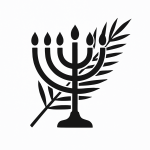The Creator’s New Year’s Day
A Biblical or Hebrew day starts in the evening when the sun first goes down. Each new day starts in the nighttime as soon as it first gets dark, but the daylight occurs in the second or last part of the day. It can be kind of hard to adjust our minds to this method of calculation when considering Biblical hours and days, because in our Western culture our new days technically begin at midnight, but we don’t really call it the next day until daybreak arrives when the sun starts shining on the earth again. In contrast, the calculation of Biblical days is somewhat reversed because they start as soon as darkness appears wherever we currently happen to be located on earth. A well-known Rabbi once declared that it is not officially a new day marked by sundown, until there are at least three stars visible in the sky. To make it easy, a good rule of thumb is to say that “Hebraic days last from sunset to sunset”. This definition of what a day consists of, to include when it starts, how it is calculated, and when it ends, is derived from the book of Genesis, Chapter 1, verses 1-5 [KJV] where we find that darkness existed on earth before there was light and specifically in verse 5 where it reads that “… the evening and the morning were the first day.” [KJV]
Our Creator’s New Year’s Day falls on the first day of the Hebrew Month of Abib or Aviv (also known as Nisan) which falls somewhere in our month of March or April. It varies between these two Gregorian months from year to year because the Gregorian Calendar of our Western Civilization is figured differently than the Hebraic one, and these two calendars almost never line up with each other the same way each year. (The King James Bible spells this month as “Abib” with “b”s but the letters “v” and “b” seem to be interchangeable when these words are transliterated into English.) The country of Israel and modern Jews have wrongfully renamed the month of Abib with the Babylonian name of Nisan during their days as captives under King Nebuchadnezzar of Babylon, and have also renamed Yom Teruah (i.e.-The Feast of Trumpets) which falls on the first day of the 7th month as Rosh Hashanah (i.e-Head of the Year). They had no authority to make this change since the scriptures already said that the head of the year was called Abib and that it was to occur seven months earlier. No one is allowed to alter YHWH’s commandments because it is written that we should not add to or diminish from YHWH’s commandments as declared in Deuteronomy 4:2 and 12:32 [KJV].
The following passages contain commandments for every man to pick out an unblemished lamb on the 10th day of the year for his house and to later kill that same sacrifice on the 14th day of the same year on Passover and the feast of unleavened bread. I only mention these verses for the sake of showing how to detect the first day of the year, because we are no longer required to kill a lamb according to the priest’s specifications since Yeshua has died to become our eternal Passover Lamb and Atonement. The declaration of the first day of the year, selection of the lamb, its sacrifice, and the week of unleavened bread are supposed to happen in the first month of the year, which is called the month of Abib: Exodus 12:1-20; 13:3-10; 23:14 & 15; 34:18; and Deuteronomy 16:1-3 [KJV] . The following six verses taken out of the aforementioned passages pinpoint that Abib has been selected to be the first month of the year:
Exodus 12:2-3 – “This month shall be unto you the beginning of months: it shall be the first month of the year to you. Speak ye unto all the congregation of Israel, saying, in the tenth day of this month they shall take to them every man a lamb, according to the house of their fathers, a lamb for an house: [KJV]
Exodus 13: 4 – ” This day came ye out in the month Abib.” [KJV]
Exodus 23:15 – ” Thou shalt keep the feast of unleavened bread: (thou shalt eat unleavened bread seven days, as I commanded thee, in the time appointed of the month Abib; for in it thou camest out from Egypt: and none shall appear before me empty:)” [KJV]
Exodus 34:18 – “The feast of unleavened bread shalt thou keep. Seven days thou shalt eat unleavened bread, as I commanded thee, in the time of the month Abib: for in the month Abib thou camest out from Egypt.” [KJV]
Deuteronomy 16:1 – “Observe the month of Abib, and keep the passover unto the LORD thy God: for in the month of Abib the LORD thy God brought thee forth out of Egypt by night.” [KJV]
Their new year begins on the 1st day of the Month of Abib because it’s the exact same month they left Egypt. Abib is a word used to describe the condition of the barley standing in the field which is almost ready to harvest because it’s brittle enough to be damaged by a hail storm even though it still looks green (like what happened in one of the plagues).
